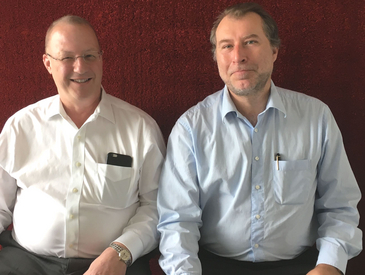The University of Bremen‘s Center for Computing and Communication Technologies (TZI) is currently playing host to a top level researcher: Professor Karol Miller from the University of Western Australia. Professor Miller, a winner of the Research Prize awarded by the Alexander von Humboldt Foundation, will spend a research year in Bremen, split into several periods of short stays. He is a recognized expert in the very special field of complex computer imaging for guiding processes in the operating theater. His biomechanical model calculations provide surgeons with information on possible distortions of body organs and can distinguish between healthy brain tissue and tumors. And his computer simulations of high risk operations to widen blood vessels in the abdomen help save lives.
Patient-related computer simulation
What led Professor Karol Miller to choose the University of Bremen for his research stay? “It’s his fault!”, he says jokingly and points to his colleague, Professor for Computer Sciences, Ron Kikinis, whose head is hidden from sight behind a large PC monitor in his paperless office. “He‘s the greatest capacity on the whole planet.” His colleague smiles modestly. They met at a congress in Tokyo in 1995; later Kikinis became Miller‘s mentor and today they are dependable companions in research. The University of Bremen’s professor of informatics and radiology leads the Creative Unit “Intra-operative Information” supported with Excellence Initiative funds (www.ioi.cs.uni-bremen.de). A Swiss national, since 1988 Professor Kikinis also conducts research in Boston, where he is Professor for radiology at the Harvard Medical School. “We started to install magnetic resonance scanners in operating theaters in 1994”, he says. Miller and Kikinis make use of the diagnostic data thus obtained to create three-dimensional patient-related computer simulations.
Visit to Hanover
But one has to remain realistic. “The bridge between research findings and implementation in the medical practice has yet to be built”, says Professor Miller. “Today it’s more of a chasm than a bridge we are faced with.” Nevertheless, Germany is ahead of many other countries in this respect, which is why during his first stay in Bremen he also spent some time in Hanover, where his contact is Professor Rudolf Fahlbusch from the International Neuroscience Institute (INI). Neurosurgeon Professor Rudolf Fahlbusch is an international designated expert for brain surgery.
Road map is in place
Networking and collaboration are two virtues of research – and nowhere is this truer than at the University of Bremen. Professor Miller has already become acquainted with members of the Creative Unit, held several lectures, and had talks with other colleagues. The road map for his research is now in place. On his next trip to Bremen he will be bringing with him some Australian colleagues from Perth. They want to make preparations for submitting proposals for third-party funding.
Praise for the University’s Welcome Center
When the conversation turns to the University and the Hanseatic City of Bremen, the Australian guest, who was born in Poland, is full of praise. “The Welcome Center was a tremendous help“, he says. “After all, it’s not so easy to take care of everything with a wife and nine-year-old twins in tow.” The Center managed to find them a short-term rent in town. “Everything we want is so nearby, a shop on every corner, a café”; he and his family are very taken with Bremen’s urbanity. “Back home in Perth, such amenities are spread far apart.” Oh, and the boys are having a great time – two months of home schooling without having to go to school. What could be better?
Bremen and asparagus
With a smile on his face, host Kikinis cuts in, “Tell them another thing I’ve taught you about Bremen”, he says. “Of course! The asparagus dinners“, says Miller. “So tasty. In the short time we’ve been here the whole family has come to love asparagus."

